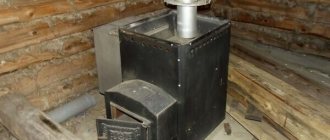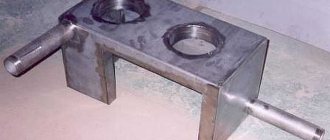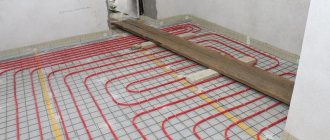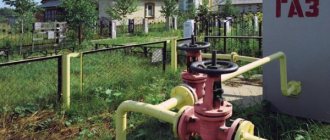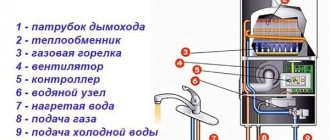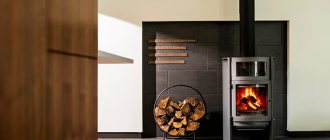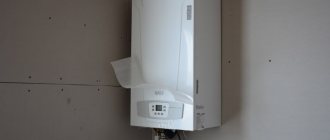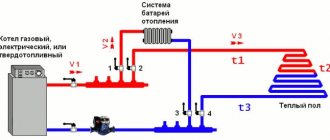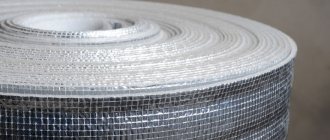In European countries today, about 70% of all country houses are heated with electricity. It is called the most environmentally friendly, convenient and safe way to generate heat. In our country, electric heating of country houses and cottages has not yet become so widespread due to the high cost of operation. Experts say that there are some ways that will allow you to heat economically with electricity. What should you do for this? What equipment will be appropriate as a stand-alone equipment, and what equipment will be suitable only as an additional and backup?
No. 1. Pros and cons of electric heating
Electric heating has become widespread due to many advantages :
- simplicity, speed and relative cheapness of system installation. The installation and commissioning of electric heating systems will cost approximately 30% less than similar work on other systems;
- ease of operation, no need for regular maintenance;
- small sizes of heating devices;
- quiet operation;
- safety, environmental friendliness and hygiene;
- high efficiency;
- long service life;
- automation of the heating system and the ability to flexibly regulate the operation of the system.
Comparison of initial costs for installing heating systems with different types of fuel
It may seem that electricity is the ideal heating method, but it also has serious disadvantages:
- cost of electricity;
- power outages, which has become the norm for a huge number of suburban areas.
If electricity is the only option to stay warm in winter, then you can deal with the shortcomings. Of course, electricity is an expensive resource, but if you insulate your house well and choose the right equipment, then costs can be reduced significantly . Of course, the climate of the region also has a significant influence, but the role of insulation is enormous: it takes about 50 W to heat 1 m 3 of uninsulated space, and if you insulate the house according to all the rules, then about 20 W of energy will be needed. Naturally, the smaller the house, the lower the heating costs will be. Electricity is best suited for small one-story houses ; in other cases, it is better to make it a backup heat source, heating the house with gas, solid or liquid fuel.
To ensure that the system does not depend on power outages , it is better to use batteries and generators running on gasoline or diesel; an alternative is to install solar panels or a wind generator.
Another important point is that the power of the line must correspond to the load that will be placed on it when the electric heating devices are turned on.
Gas electricity or wood
Today, many people prefer electricity as an energy source for heating their homes. This heating method has a number of advantages that make it modern, convenient, efficient and economical.
The opinion of developers and owners of country and private houses is that electric heating is the most profitable, since it does not require many approval documents. And there will be no need for large financial costs when installing this heating system. The average market price of an electric heating boiler for a heated area of 100-150 sq.m. is 35-36 thousand rubles. If the area of the house is smaller, then the cost of purchasing a boiler will be lower. At the same time, the choice of electric heating systems is so wide that every home owner can choose what meets his requirements for ease of installation and an affordable price. Other benefits include:
- equipment for an electric heating system does not require the expenditure of time and money to obtain a project, technical specifications and commissioning certificate, as for example with gas equipment;
- there is no need for excavation work and pipe laying;
- electric heating has a high level of safety and environmental friendliness (electric boilers, unlike gas boilers, never explode and do not form dangerous combustion products (carbon monoxide);
- Electrical heating devices are fully automated, simple and reliable to use.
In addition to electric boilers, you can use alternative electrical equipment, for example, electric convectors for local heating of each room separately, thermal curtains, heated floors, which will allow you to maintain a comfortable temperature in the house without high financial costs.
Along with the advantages, the electric heating system also has disadvantages. There are few of them, but they still exist. First of all, the disadvantages include:
- The need for stable voltage. If the voltage constantly fluctuates and power outages often occur, then it is not practical to equip the house with an electric heating system.
- High power consumption. Especially in the autumn-winter period. For heating a house with an area of 150 sq.m. you will need 15 kW per day, not counting other electrical appliances.
- High cost of electricity.
For clarity, let’s compare electricity with other energy carriers – solid fuel (wood) and gas.
Stove heating in a house with an area of 100-150 sq.m. will require the purchase of 20 cubic meters of firewood for one heating season (7 months - from October to April). The average market price for 1 cubic meter today is about 2,000 rubles, and birch firewood is 3,500 rubles per cubic meter. One heating season will cost the home owner a decent amount. As you can see, there is no saving as such. Unlike electric and gas heating, a wood stove requires constant attention and monitoring, as it has a high fire hazard.
Gas heating for any area of the house is several times cheaper than solid fuel and electricity. However, not all regions, and especially small villages, have the opportunity to join the main gas pipeline. But even if there is such a possibility, equipping a home with gas heating may not always bring savings. If we evaluate each energy carrier in terms of total costs, including the purchase of equipment, installation and operation, then electricity will be much more economical.
No. 2. Options for electric heating of a country house
Electrical heating systems can be of two main types:
- those that use an intermediate coolant;
- those that immediately convert electrical energy into thermal energy and transmit it to the environment.
The first type includes boilers and oil radiators , and the second type includes convectors, infrared heaters, fan heaters and electric heated floors .
Actually, this is a list of possible options for electric heating of a dacha. The type and number of devices are selected depending on the size of the room and the frequency of people being there.
Heat guns
At the dacha, you can use electric heating guns that will help maintain the desired temperature. These devices are environmentally friendly - during operation they do not create harmful emissions and do not pollute the atmosphere. Depending on the design features, the device can use a spiral or a heating element for heating and operate from both a two-phase and three-phase network.
Such a gun will cost slightly more than similar models without a thermostat, but will provide a number of functional advantages:
- the ability to automatically turn off the device when the set air temperature is reached;
- preventing air overheating;
- reasonable use of resources.
No. 3. Heating a country house with an electric boiler
The main part of an electric boiler is a heat exchanger , a tank with heating elements. They heat the coolant (water, antifreeze, oil), which circulates through a system consisting of pipes and heating radiators - everything, as is the case with a gas or liquid fuel boiler. In addition, the system often includes an expansion tank, a circulation pump and a safety valve. Induction and electrode boilers work somewhat differently.
The advantages of this heating method are obvious: no smoke and no need to install a chimney, quiet operation, safety, high efficiency (up to 99%), ease of operation and temperature control. Due to the high cost of electricity, such boilers are installed mainly when a country house is not used for permanent residence. In addition, do not forget about the need for good electrical wiring.
The following types of electric boilers can be used in the heating system
- Heating element boilers are the simplest and most popular devices . The principle of their operation can be compared to a conventional electric kettle. Heating elements, of which there are usually 3-4 in a boiler, heat the coolant (water) in flow mode. Depending on the required temperature, the heating elements are turned on together, one at a time or in groups. Heated water circulates through the system, and for better pressure and circulation, circulation pumps are usually used. The power of such boilers ranges from 3 to 50 kW; there are models operating from a single- and three-phase network. Advantages of heating element boilers: compactness, low price, ease of installation. A significant drawback is the formation of scale on heating elements, which leads to increased energy consumption and gradual failure;
- Electrode boilers operate without heating elements. Their main part is electrodes. When current passes from one electrode to another through a liquid, the latter heats up under the influence of its own resistance. Antifreeze is used as a liquid. The power of electrode boilers is 5-25 kW. Such devices do not have the main drawback of heating element boilers - scale formation; they are compact, safe in case of water leakage and inexpensive. But they require mandatory water treatment, water must circulate strictly at a certain speed, and the electrodes gradually wear out and therefore require periodic replacement;
- Induction boilers also do not have heating elements, and heating of the electrical medium (water, oil, antifreeze) is carried out due to electromagnetic induction. These are the most economical boilers to operate, there is almost no scale formation in them, durability is excellent, but the purchase costs will be considerable, and the dimensions of such boilers are decent.
In addition, all boilers are divided into single-phase (consume 220 V voltage) and three-phase (380 V): the first are suitable for small houses and dachas that are visited from time to time, the second - for large dachas. Boilers are also divided into wall-mounted and floor-mounted , single-circuit and double-circuit (these also make it possible to organize hot water supply to the dacha).
As for the boiler manufacturer, to ensure reliability and durability it is not at all necessary to give preference to imported equipment - domestic products are better adapted to our operating conditions. By the way, craftsmen use a regular boiler . It will cost even less, but there will be a few more problems.
Electric boiler for a summer residence - the final choice
Having decided on the brand, the consumer will have to solve another dilemma, namely, answer the question: install a 380V electric heating boiler at the dacha or give preference to a model that operates with a 220V mains voltage? It is worth understanding that the first option requires good wiring that can cope with high loads. Therefore, owners of old country houses with poor wiring should refuse the idea of using a 380V electric heating boiler for heating, the price of which is about $500 for a 6 W model.
Summing up the consideration of the option of heating a dacha using electric boilers, we can highlight a number of nuances.
The advantages of the devices include:
- quiet operation;
- high efficiency;
- no need to obtain permits;
- simple installation and simple operation process.
The disadvantages of devices should also be taken seriously:
- high electricity consumption;
- a solid investment in purchasing a quality boiler from a reliable manufacturer.
No. 4. Convectors for heating cottages
An electric convector is one of the most popular methods of heating a country house. You can install the device anywhere, it is simple to operate, does not take up much space , and warms up the room quickly and quietly , with an efficiency of about 95%.
A tungsten coil is used as a heating element, which can heat up to 600 0 C. It is placed in a ceramic insulator, which is housed in an attractive steel or aluminum housing. At the bottom of the case there are openings for cold air to enter, and at the top for warm air to escape. The heated air rises, giving way to cold air, and so on in a circle.
No. 5. Oil radiators for summer cottages
You can consider an oil radiator as the only source of heat only when the dacha is small and you appear there infrequently ; in other cases, it is a backup and additional method of heating. The design of such devices is simple: the heating element transfers energy to the oil (coolant), which circulates inside the device body. The oil heats the body, which, in turn, heats the air in the room. You can heat a room to an acceptable temperature with such a heater without any problems. Among its advantages :
- the ability to transport from one room to another;
- high level of safety, the surface does not heat above 60 0 C;
- durability and reliability;
- noiselessness;
- low price;
- no unpleasant odors.
Such devices do not heat the room very quickly, but they also cool down slowly, maintaining a comfortable temperature for a long time. For faster heating of the room, some models have a built-in fan. Device power is from 1 to 2.5 kW. The power calculation is approximately the same as with a convector.
Electric heaters
Modern heating devices not only successfully cope with heating a dacha, the degree of comfort in using such equipment is quite high. Setting the thermostat allows you to maintain the set temperature in the room even during your absence.
https://youtube.com/watch?v=KeBhDgxgI0g
Some models are equipped with a timer that can be programmed to turn on the device before traveling out of town. Such “smart” devices can be controlled by sending SMS messages. In this way, you can both turn on and off the electrical appliance.
Convectors
The most common devices designed for electric heating today are special convectors. Installation of such devices does not take much time. Most often they are installed on the wall, in rare cases on the floor. The operation of the device is based on the principle of air convection.
The convector provides uniform heating of the entire room. A heating element built into the bottom of the device heats the air passing through it. Warm air currents quickly heat the room. The heater's thermostat maintains a constant temperature in the home.
Oil radiators
Inside the body of such devices there is oil, which is heated by a heating element. The surface of the device heats up and transfers heat into the room. To speed up heat exchange, some models are equipped with fans.
Infrared heaters
Usually installed on the ceiling. The infrared waves emitted by such devices are absorbed by surrounding surfaces and transformed into thermal energy. When heated, the surfaces give off heat to the air in the room.
Using such devices, it is possible to organize heating of a specific area in cases where it is not necessary to heat the entire room. The capabilities of IR heaters can significantly reduce energy costs.
No. 6. Fan heaters for cottages
A fan heater is another way to backup heating a country house . It is not possible to constantly maintain the required temperature. However, fan heaters have earned great popularity because:
- are inexpensive;
- compact and mobile;
- allow you to quickly warm up the room;
- easy to operate.
Disadvantages include inefficiency, fire hazard, noise and unpleasant odor, since during operation dust and dirt particles get onto the hot coil. You cannot warm up a large area with such a device, but for this there are thermal curtains and heat guns , which work on the same principle as a fan heater.
The device is quite primitive: air masses are heated by contact with a heated heating element, and are moved due to the presence of a fan. The differences are only in the type of heating element (spiral is the cheapest, but dangerous, and ceramic is safe, but expensive), power (0.4-2.5 kW), type of control, and the type and shape of the fan.
No. 7. Infrared heaters
Infrared heaters are 20-35% more economical than conventional electric boilers , and experts are confident that such devices will soon become on par with traditional heating systems. So far they are losing to their competitors in terms of popularity, but the demand for them is growing at an immediate pace. The principle of operation is to convert electricity into infrared rays, which heat not the air, but objects, like the sun. Heated objects release heat to the environment, and the room temperature rises. Objects are heated only in the area where the heater rays are directed.
Infrared heaters are presented in two modifications:
- devices on legs;
- flat panels that are attached to walls or even ceilings.
It will not be possible to quickly heat a room in this way, but due to their efficiency, environmental friendliness and operating features, infrared heaters can be used as an independent source of heat in a country house , unless, of course, they live there permanently. Remember that such devices are often placed in the open areas of cafes, so for autumn and spring outdoor gatherings these heaters will be just right - you will get a warm and cozy relaxation area.
The power of such devices ranges from 0.25 to 3-4 kW. Infrared heaters are fireproof and durable, can last up to 25 years .
No. 8. Warm floors for a country house
Warm floors will create the most comfortable conditions for staying in a country house. To install an electric heated floor, the following are used:
- cable , which is laid in waves, stripes or zigzags in the necessary parts of the room;
- infrared film, which works on the principle of infrared heaters and is easy to install. It is even used for arranging “warm ceilings” and “warm walls”.
Warm floors are called a more or less economical method of heating due to the presence of an automatic control system and proper heat distribution, but still such heating cannot be called cheap. In operation, a film floor will cost less , but the film is more expensive than electrical cables.
The main advantages of electric heated floors include:
- ease of installation and operation;
- uniform heating of the entire room;
- safety;
- durability;
- the ability to adjust the temperature down to 0.1 0 C;
- no need to allocate space for a boiler, radiators or heaters.
If the area of a country house is large, then it is impossible to consider a warm floor as an independent source of heating.
Availability of automation
A boiler for heating a private house must have more complex automation.
Choosing boilers is a responsible matter; you also need to pay attention to the presence of automation. It should be taken into account that any type of equipment is designed to solve a certain number of problems, its functionality will also be different
For a city apartment, it is enough to heat the water to the required temperature; some models can supply coolant to the radiators. Complex automation is simply not needed here, since the functions of the boiler are quite limited. For such wall-mounted boilers, it is enough to have automatic ignition and draft sensors. This is not enough for a country house; to ensure high functionality and safety, it is necessary to have more advanced automation.
The boiler rating here is as follows:
Boilers with automation, which allows you to adjust the heating level depending on weather conditions, are in first place. External temperature sensors and temperature indicators in the house are installed here. Such a system makes it possible to use gas economically, since when the temperature outside and in the house rises, its supply is simply reduced or stopped. The boiler turns on only when necessary, and this makes its operation very efficient.
Often in spring and autumn a situation arises when excessive overheating of the premises occurs. This happens due to the fact that the coolant is supplied to the heating system at a constant temperature, and this is not always necessary.
Therefore, you should pay attention to gas boilers that have special programmable devices that allow you to regulate heating according to a schedule. Automation includes many monitoring sensors, which, according to pre-specified data, provide control
It is advisable to use such gas boilers not only for a country house, but also for a city apartment. When rating boilers, it is necessary to put them in first place as the most efficient and capable of creating the most comfortable living conditions. But such devices are much more expensive than others, and this is also worth taking into account.
When making a choice among heating boilers, one must also take into account the presence of automation that allows hourly programming. Such automation provides a real opportunity to make settings for literally every day of the week separately. In this case, at night there will be a decrease, and during the day there will be an increase. This allows you to significantly save gas
Such gas boilers are not only efficient, but also economical, and this is very important today. When purchasing a boiler, all settings are simply immediately entered manually or selected from an already established list
There is no need to control the temperature; gas boilers independently regulate the gas supply and coolant temperature. Such equipment often tops a special rating of boilers; it is not only economically profitable, but also beneficial for health, since the air temperature at night, slightly reduced to a certain value, has a positive effect on the general state of human health.
The rating of gas boilers is a real opportunity to correctly and quickly select exactly the equipment that is optimally suited for specific conditions. According to the specified data, it is possible to determine what power is needed and under what conditions, what requirements are imposed on the equipment itself, whether automation is so important and under what conditions it is simply impossible to do without it. The following tips will help you choose equipment that will work effectively for many years, providing comfort and coziness in your home.
No. 9. Split systems for heating
A split system can not only cool a room, but also heat it. Let’s make a reservation right away: this is possible only at positive external temperatures , i.e. It will be possible to receive heat from a split system in the autumn and spring, when it is about +1...+5 0 C outside. The device can be considered a backup heat source when it seems too early or too late to turn on the main heating system, and it is too late to warm up I want it in the house.
It is worth remembering that a split system is not a heater, and it does not have a heating element. Hence the restrictions on external air temperature. The output of warm air by a split system can be called freon reverse: heat is taken from the street and supplied inside, and this can be called not heat generation, but pumping it. Consequently, the closer to zero the temperature outside, the lower the efficiency of the split system for heating. At positive temperatures, the amount of heat supplied to the room can be 2-4 times greater than the amount of energy spent on it.
It is still difficult for electricity to compete with heating systems using liquid, solid and gaseous fuels. In addition, there are ways to obtain heat from alternative energy sources. But in some cases, a country house cannot do without electric heating, and the task here is to choose the most suitable heat source, and, of course, to save energy correctly.
Recommendations for selection
Why do people choose these devices?
Obviously, it’s all about the advantages over gas and wood-burning counterparts. Advantages of an electric heating system:
- There is no need to install a chimney to remove combustion products or connect additional ventilation. Accordingly, there are no restrictions on installation and coordination with housing and communal services authorities.
- Ease of control and programming of modes. Heating devices allow you to set the required coolant or air temperature on an external sensor.
- Possibility of using a differentiated tariff schedule. That is, during the day the cost of electricity is more expensive, at night, when peak consumption passes, it is 40-60% cheaper. If you purchase thermal accumulators as part of the boiler kit, you will save money by storing heat at night and using it during the day.
- Safety. The risk of system boiling and explosion is reduced to zero.
Heating a house with an electric boiler has the following disadvantages:
- High cost of electricity.
- Constant power surges damage the automation. The result is rapid defrosting and damage to the entire heating structure.
We list the main parameters and technical characteristics of boilers for heating systems, on which the choice depends:
- Manufacturer. It is better to consider products from well-known brands. The concerns have an extensive network of service centers that will provide quick and high-quality repairs.
- Power. Before going to the store, do not forget to carry out its correct calculation in accordance with the level of heat loss at home.
- Efficiency – no less than 95%. Electricity is the most expensive fuel, so productivity must be maximized.
- Security group. Mandatory: thermal fluid temperature limitation (up to +85 ºC), protection against overheating, dry running, pressure sensors and others.
- Number of circuits. Single-circuit boilers should be used strictly for their intended purpose, and for hot water supply, purchase separate storage boilers or indirect heating.
- Optional equipment. The piping of a high-power boiler must include a heat accumulator, a stabilizer, and if electricity is often cut off in the area, then generators running on diesel or gasoline fuel. The risk of heating system failure is reduced to zero.
To paraphrase well-known authors, we can say that electric boilers are not a luxury, but a means of heating in the harsh Russian winter.
System advantages
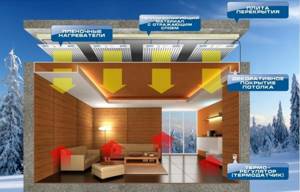
The main advantages of electric heating in the country are:
- Economical. Oddly enough, if the heaters are turned on infrequently, the monthly bill for light will be several times less than with other options for heating rooms.
- Ease of installation. Typically, electric heaters are either floor-mounted or wall-mounted. You can simply connect them to the network via a plug and socket. If the equipment is powerful, a separate group of wires is output from the junction box. In any case, it is easier than installing radiators and connecting a water heating boiler yourself.
- Easy to use. Electric heaters are easily programmed by thermostats and control units. You can set the program for a month almost for every specific day. In addition, the electronics will control the temperature, using their power efficiently.
- Reliability. Another advantage of electric heating in the country is its high durability. The equipment will not fail due to scale, there will be no water leaks or other problems.
- Mobility. Convectors, IR panels, oil heaters and fan heaters can always be moved from place to place without significant dismantling work.
Combination boilers
Attention: If your cottage is located in a rural area, it is best to install a combination boiler that can be heated not only with electricity, but also with solid fuel. This allows you to significantly reduce the costs of both the equipment itself and its maintenance.
The main advantage of a combination boiler is its versatility, because it can use both electricity and various solid fuels, for example, wood or coal. Thanks to its design, this device is able to maintain the desired temperature for a long time. Including if there is no one at the dacha. In this case, the power of its operation will be minimal.
Its versatility allows you not to worry about possible power outages. After all, if you have a supply of coal or firewood, they can easily replace electricity.
Thanks to their many advantages, combination boilers make it possible to quickly and efficiently heat any country house with electricity or solid fuel, even in extreme cold. In addition, their use allows you to save a lot of money. After all, their operating power may change. Including automatically.
Suitable equipment for specific conditions
First of all, it must be said that for each specific case you need to choose the right electric heating system for your dacha. It all depends on how often you visit your country house and for what purposes it was built for you. Let's consider each of the existing situations in more detail.
Rare visit
If you visit your dacha plot extremely rarely, especially in winter, then of course there is no point in installing a capital heating system at your dacha yourself. Here it is recommended to use the connection of electric convectors, fan heaters or oil radiators. Convectors can be wall-mounted, floor-mounted, or installed on casters. Each type of design has its own advantages and disadvantages. We recommend that you immediately familiarize yourself with the tips on choosing an electric convector in order to buy the most suitable model for heating your dacha.
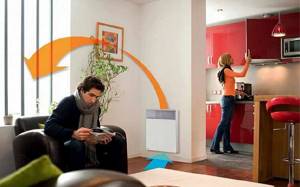
As for fan heaters and oil heaters, they allow you to warm up the room in the shortest possible time, which is exactly what you need for a rare visit to the dacha.
Weekend getaway
If the country house is represented by an insulated capital building, it already makes sense to make better electric heating for the country house yourself. The best solution in this case is a heated floor, which allows you to warm up the room in a short period of time and maintain a certain temperature in the house for as long as needed.
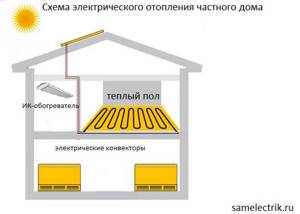
A heated floor alone may not be enough if you decide to install electric heating in a dacha with an area of 100 square meters or more. In this case, it is recommended to supplement the system by connecting infrared heaters that have high efficiency and relatively low energy consumption. A combination of heated floors and IR panels, as shown in the block diagram above, will allow you to quickly and inexpensively warm up a country house for a weekend getaway in winter.
Frequent visit
Well, the last option, which is the least common, is a country house in which the owners spend a significant part of their time. Under such conditions, it is necessary to take care of high-quality heating, and if there is no gas at the dacha, be sure to make electric heating yourself.
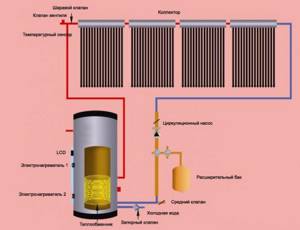
It is no longer rational to use equipment with high energy consumption - fan heaters and oil heaters. A more competent solution would be to connect an electric boiler operating together with water radiators.
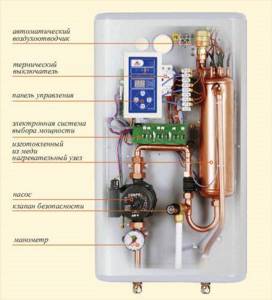
In addition, it is recommended to connect electric heated floors in the rooms, and, if necessary, install IR ceiling panels controlled by temperature controllers. Such a dacha heating system does not require the installation of a chimney, obtaining various permits and calling a specialist for installation work, which makes it the best if there is no gas on the site.
We immediately recommend watching a video with an overview of a modern electric heating system, which in a short period of time has gained many positive reviews on the Internet:
Let's sum it up
When choosing electric heating devices, each owner is guided by his own needs. For those who spend a lot of time in their country house in winter, we can recommend electric boilers for heating the country house, ceiling infrared systems or heated floors. The most profitable option is a boiler. If you install a two-circuit model, then the dacha will be in no way inferior to a comfortable residential building.
If in severe frosts the owners do not come to the dacha for a long time, then heaters can be used. They will not replace full-fledged heating systems, but will help maintain acceptable temperatures in the fall and spring. They can also be purchased as additional heating devices for a house that already has a main heating system - gas or solid fuel.
teploguru.ru
What could be the “pitfalls”?
Well, as you understand, there is no ideal option for all conditions, and the problem that you may encounter when independently connecting electric heating at your dacha is frequent power outages in the area. Indeed, in many villages problems with electricity still arise, and in our case, if there is no light, then there is no heat.
Therefore, of course, first of all take this point into account if you want to make electric heating for your dacha yourself. In any case, you can get out of this situation without any problems by purchasing an additional gasoline or diesel generator (shown in the photo below), but this requires additional money, which not everyone can allocate!
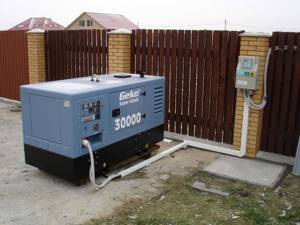
That's all the information about this issue! We hope that now you know how to properly install electric heating and what nuances exist in relation to a country house!
Also read:
Content
How does an electric boiler work?
In order to choose the right electric boiler for heating your home, you need to know its characteristics and make sure that they meet the network requirements. Any electric heating boiler for a home includes the following elements:
- Frame. The outer shell, inside which all the boiler parts are assembled;
- Heat exchanger. Heater and container with coolant;
- Control block. Process control, monitoring and regulation system.
Diagram of an electric boiler with a heating element
Video description
What is better to choose: an electric boiler or an electric convector - see clearly in the video:
NOBO, a leading European manufacturer of convectors, produces two compatible systems for “smart” control of electrical appliances. Including “warm floors” (via a thermostat) and any other household appliances that are connected to the network (via a panel, a “break” in the circuit or turning on/off sockets). To do this, they produce special thermostats, socket receivers and hidden-mounted relay receivers.
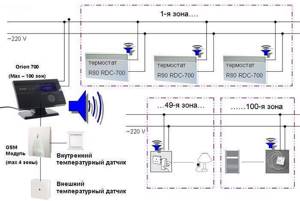
One of two control schemes for a multi-zone electrical systemSource stroydoma74.ru
How to calculate the power of an electric boiler
Before buying a boiler, you need to calculate the required power. The boiler power must take into account electricity limits. Due to the limitation of electricity supplied by local electrical networks, if consumption exceeds the circuit breaker, the circuit breaker is triggered, and the heating system of the house may be de-energized. Thus, when choosing a boiler power, you should be guided by calculations and not exceed it.
A limitation may be the cross-sectional area of the supply electrical cable. When choosing a single-phase or three-phase boiler, it is necessary to check that the power of the equipment matches the cross-section of the installed cable. In addition, boilers with constant and variable (modulated) power are offered on the market. The former are more preferable because they cannot allow excess electricity consumption.
An approximate calculation of power takes into account the area of all heated rooms in the house and is done according to the formula: M = P x Where. / 10m2
where M is the power of the electric boiler (kW);
P – area of heated premises;
Where. – specific boiler power, depending on the region:
- for cold climates Kud. 1.2 – 2.0
- for moderate 1.0 - 1.3
- for southern regions 0.7 – 0.9
As practice shows, to heat a house with an area of 100 m2 in the middle zone, you need an electric boiler with a capacity of at least 100 x 1/10 = 10 kW. In addition to power, heating equipment can be selected according to the area and volume of the house.
How to calculate the power of an electric boiler based on the area of the house
The simplest method for selecting equipment based on the area of the house is based on determining the standard heat loss per meter of heated area. But the standards for small buildings up to 200 sq.m. of heat loss per 1 m2 of area are 0.1 kW. With a house area of 100 m2, the estimated amount of losses will be 0.1 x 100 = 10 kW. Adding 20% to the resulting heat losses (adjustment for abnormal cold), we get 12 kW.
Thus, for a house of 100 m2 you will need an electric boiler with a capacity of 12 kW. Accordingly, for a house with an area of 150 m2, the required boiler power will be: 0.1 x 150 x 1.2 = 18 kW. For a house with an area of 200 m2: 0.1 x 200 x 1.2 = 24 kW
How to calculate the power of an electric boiler by room volume
Calculation of the power of an electric boiler for heating a house by cubic capacity is based on a norm of 4 - 8 Wh of electricity per unit volume. The result of the final calculation depends on the heat losses of the entire house and the specific value of these losses during the season. The additional coefficient in the calculations depends on heat loss through the walls of the house, windows, pipelines laid in cold rooms, etc. The estimated duration of the heating season is 7 months.
Which electric boiler is the most economical?
The criteria by which heating boilers for a private house using electricity are selected are as follows:
- heating area, on which the boiler power will depend;
- characteristics of the premises;
- equipment prices;
- size and weight of the heating boiler;
- life time;
- boiler efficiency.
We will choose from the following types of electric boilers for heating:
- Induction. The main working unit of such boiler boilers is the inductor. These boilers have great power, but are large in size and high in cost.
- Heating elements. The coolants in such boilers are heated by thermoelectric heaters (TEHs), working with power controllers and temperature sensors. The heating element heats the water, which transfers heat to the room. The disadvantage of such boilers is the deposit of scale, which interferes with normal operation and disables the heating elements.
- Electrode. The most economical boilers are approximately 40% more economical than heating elements. The advantages also include small size, fast heating of water and the absence of scale during operation.
Electric boilers, in addition to the listed types, can also be:
- Wall or floor. Wall-mounted boilers, as a rule, are low-power, and are used for heating country houses;
- Single- and three-phase;
- Single and double circuit.
The final decision on which most economical electric boiler to choose for your home depends on your living conditions. In my opinion, this is an electrode boiler, which is connected to a standard electrical network and uses water or non-freezing liquid as a coolant.
Diagram of the electrode boiler
Why is electric heating better?
Heated discussions often arise regarding the advisability of using electric boilers for heating homes. There are fans of different opinions; they especially like to focus on the high cost of electricity. But if we put aside for a while the question of the cost of heating a room using different methods, it will immediately become clear why using electric heaters is more profitable.
- Electricity is available in almost all holiday villages, unlike gas.
- Gas equipment is more difficult to install; it requires specialists.
- Firing wood and coal requires their preliminary preparation.
- Any supply of fuel, except for main gas, tends to run out at the most inopportune moment, and electrical energy is “infinite.”
Of course, diesel vehicles have the best autonomy, but they also require a supply of fuel, and electricity is supplied in almost unlimited quantities, as long as the owner of the dacha pays on time for its use.
Rice.
2 An electric boiler takes up minimal space. All options, except electric boilers, use the combustion of one or another fuel, and this immediately creates the danger of fire and carbon monoxide entering the room. Such methods of heating a room require constant monitoring by the owner, which is not always possible, and if you turn off the boiler while you are away, it will not be easy to maintain the room in a comfortable condition.
If we return to the issue of price, the main thing in the calculation will be the cost of the boiler itself. Gas and diesel models are several times more expensive than electric ones. So the price of “consumables” plays only a secondary role; given the high cost of the boiler, you will be able to save money only after several years of its operation.
For some people, it may also be important that electrical equipment is environmentally friendly, there is no waste from it, there is no need to dispose of it, etc. Their operation is not accompanied by any noise, as is the case with wood-burning stoves.
If desired, electric heating can be combined with other methods, which gives a certain freedom of choice, and in case of emergency situations with power supply, it will allow you to do without lowering the temperature in the house, maintaining its comfort and coziness.
Which electric boiler is best for heating a private home?
The popularity of electric boilers is determined by:
- security;
- low cost;
- reliability;
- small in size;
- ease of installation and operation;
- silent operation;
- environmental cleanliness.
To choose and buy the best electric boiler, you need:
- make calculations and determine the required power;
- decide on the type of boiler;
- compare options of the selected type and select the best one.
Let me remind you that before purchasing, you must definitely check the operating mode of the local electrical networks - perhaps the networks will not cope with the required load, and the purchase will be in vain.
When deciding which electric boiler to choose for heating a private home, most consumers choose heating element boilers. They are much cheaper than electrode and induction boilers and are easy to maintain. Judging by customer reviews, the best electric boilers on the Russian market for heating a private home are:
- Polish units “KOSPEL EKCO” with an efficiency of more than 99%. Boilers from this manufacturer are used for radiator heating and can work together with water heaters for hot water supply. The company offers manual models for small rooms, and automatic three-phase models of boilers with a power of more than 50 kW for large rooms. The disadvantage of boilers is typical for heating equipment - scale formation on the heating elements. According to customer reviews, boilers from this manufacturer are very economical and reliable.
- Russian electric boilers are also popular in the domestic market. Boilers of three power levels from this manufacturer operate from a conventional and three-phase network, and, according to customer reviews, are quite reliable.
- Electrode boilers have also proven themselves well. They are more economical than heating elements and allow you to do without thermal elements. The most popular boiler of this group is considered to be the Geyser model, whose power ranges from 9 to 15 kW. Low-power “Ochag” models and large “Vulcan” boilers with a power of up to 50 kW are also known on the market. The disadvantages of such boilers are the risk of electric shock and the mandatory involvement of a specialist to replace the electrodes.
- Induction boilers are represented by Russian models “SAV” from INERA. The price for such equipment is high - from 30 to 160 thousand rubles, which depends on the power (for induction boilers it is 2.5 - 100 kW).
The photo shows a Polish electric boiler “KOSPEL EKCO.R1-6”
How to properly connect an electric boiler to the heating system
Briefly about how to properly install an electric heating boiler in a private house. To begin installation work, we list the basic safety rules that must be observed:
- When connecting the equipment, the power must be turned off.
- The following distances must be maintained between the boiler and the nearest structural elements of the house: to the wall - at least 5 cm, to the ceiling - at least 80 cm, to the floor at least 50 cm, to the nearest pipe - at least 50 cm.
- The front panel must be freely accessible for maintenance.
- The connection network must be three-phase (380 V) to avoid spontaneous combustion and short-circuiting of the wiring.
- Wire connections must be protected from water and sealed. It is better to protect the cable with corrugation or a cable duct made of self-extinguishing material.
Step 1 - installation of an electric boiler
The floor-standing boiler is installed on a special stand, which is sold complete with the unit. The wall-mounted one is attached to the wall with anchors and dowels. The vertical and horizontal position of the boiler must be accurate - misalignments can lead to failure or premature wear of the equipment.
Step 2 - connecting the boiler to the electrical network
- An electric boiler usually has more power, so it needs to be connected not from an outlet, but from the mains. From the distribution box in the room you need to lay a separate line to the boiler installation site. It is better to hide the cable to protect it from accidental damage.
- The cable cross-section must be selected so that it can reliably withstand high loads. Electric boilers up to 7 kW can be connected to a single-phase network, which, as a rule, was preserved in old Soviet apartments. For small boilers up to 3.5 kW, a separate line is not needed; they can be connected directly to the outlet.
Step 3 - install protection
- A residual current circuit breaker (RCD) and a circuit breaker must be installed on the main panel after connecting the wires to the electric boiler. The purpose of RCDs and circuit breakers is to protect against short circuits and wiring overloads.
- A voltage stabilizer will be needed to prevent the boiler from failing in the event of voltage fluctuations. It is strictly forbidden to use the equipment without grounding. The grounding wire must go from the bus to the boiler body.
Step 4 - starting the boiler
After the wiring is connected, you need to make sure that there are no exposed contacts. All taps, couplings, joints, etc. must be inspected and verified. First, the valves and valves are opened, and then the power supply to the boiler is turned on. Temperature and pressure sensors must operate according to the instructions. In case of obvious deviations from the norm, turn off the boiler and call a licensed specialist.
What is the most important thing in choosing?
It will be easier to choose an electric heating boiler for your dacha if you approach the problem not only from the standpoint of saving money or ease of installation. Design features are also important in all his further work. For example, a type of heaters.
There are several important points because of which dacha owners opt for strictly defined models. So, the first parameter that interests all buyers is a three-phase boiler or a single-phase one. In all holiday villages there is a connection to the power supply network, but not everywhere there is a line with three phases. Typically, in case of boiler power greater than 12 kW, three-phase power is usually used.
The type of housing design also depends on the power. Consumption above 60 kW affects the size and weight, so such models are available in a floor-standing version. Noticeably lighter, “low-power” modifications are more often found in cases for wall mounting. This saves more space and allows you to hang boilers above plumbing fixtures or other interior elements, where they will not interfere later.
Those who like to stay at the dacha for a long time will find double-circuit electric devices useful; in addition to the direct benefit of heating the room, they can also provide hot water for washing. Single-circuit models are intended only for heating a building.
Rice. 3 Scheme of double-circuit water heating
And one moment. In addition to the expected amenities, when choosing the best option, it is worth taking into account further costs of operating the boiler. According to the heating method, they differ in heating elements.
- heating element.
It is considered an outdated heating method because... the efficiency of such heating is lower than that of both previous options. In addition, they are not so safe, because in the absence of coolant they fail due to overheating, but for other types of heaters this is not critical. - Electrodes.
Heating is carried out by direct heating of the coolant. If its level in the heating system decreases sharply, no accident will occur, which is typical for heating elements (they will overheat and fail). The efficiency of such models is noticeably higher, which ultimately affects the efficiency of the boiler. - Film.
The most economical type of heaters. It has been used recently, but it has already earned considerable popularity, because the body sizes of models with a film heating element are very modest.
When choosing power, it is worth considering such points that if models with low consumption (up to 3.5 W) can be connected to a regular outlet, increasing consumption to 7-12 W will require a separate line from the meter.
There are models of boilers that combine two types at once, for example, electric-wood or electric-solid fuel modifications. They take up little space compared to the simultaneous installation of two different models and allow you to quickly replace one type of heating with an alternative without switching the system from one boiler to another.
It is worth paying attention to the year the boiler was developed, because Newer models tend to be more economical and have better protection against overheating. Even their slightly higher cost should not be a deterrent, because future expenses are also important.
How to make an electric boiler with your own hands
Electric boilers for heating a private house at 220 volts are often made independently - it is not difficult if you have the necessary materials and skills. The simplest boiler is a metal container in which heating elements are installed. Usually they make their own boilers with a power of 6 kW - such equipment is enough to heat a small apartment or country house. A DIY boiler will cost at least half as much as a purchased one. You can make a heating or electrode boiler yourself.
Materials for making a boiler using heating elements
For such a boiler you will need a tank of any shape in which the water will be heated by heating elements. The tank can be made from a 150 mm pipe. For a small boiler, 2-3 heating elements are enough, each costing about $10. Materials:
- steel pipe 150 mm;
- round plates l. 150 mm, 2 pcs.;
- nozzles no less than the contour - 3 pcs.;
- heating elements;
- nuts;
- automatic air vent;
- ball valve
